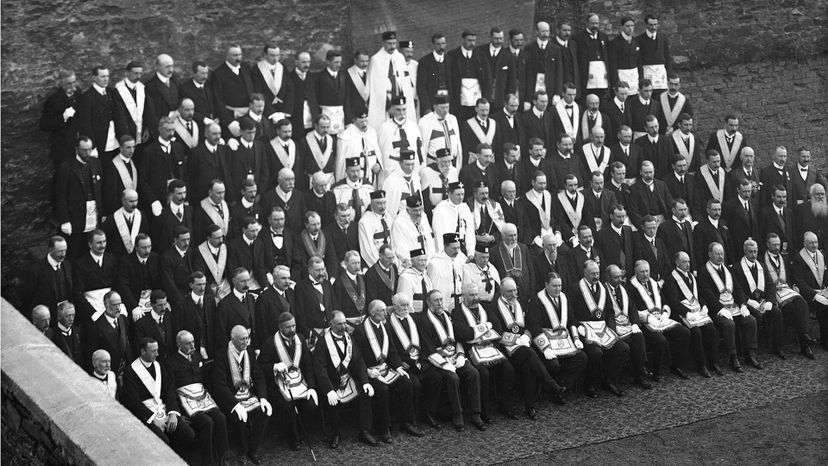
About This Quiz
They’ve been ostracized as politically-subversive dissidents. Some suspect they’re part of the New World Order, out to reform society in their vision. Or maybe they’re just black-hearted witches. For centuries, outsiders have scratched their heads regarding the Freemasons, a worldwide group that has a reputation for secrecy. In this hard-hitting investigative quiz, do you really know anything about Freemasonry?
As the name implies, the Freemasons have their roots in an ancient trade. That craft made many men rich, but it required a degree of professionalism and credentials that other people tried to emulate. So the real pros formed their own groups to keep copycats at bay, and to keep their pay rates fair. Do you recall some of the primary purposes of mason guilds and groups?
In the process, Freemasons garnered an aura of secrecy that pervades even today. Many members don’t talk about their activities, which further deepens the suspicions of others. But they’re not witches… really. Peek behind the closed doors of this Freemasons quiz now!
The Freemasons are a collection of fraternal organizations. They have a reputation for secrecy, but that's actually not an accurate depiction of these groups.
In the 14th century, stone masons created a serious of credentials to protect their craft. The Freemasons have since evolved into a much broader series of activities.
Freemasons began with stone masons. They often used tools like the square and compass to do their jobs, so these are the organization's traditional symbols.
Advertisement
Freemason activity centers around their beloved Lodge. That's where they hold meetings, conduct club business, and plan to take over the world, and we're probably joking about that last part.
In the early days, stonemasons proved their legitimacy by using secret symbols and words. The idea was to keep outsiders from infiltrating their trade and their network of clients.
Scotland, the birthplace of so many of Western cultural touchstones, also gave rise to the Freemasons. The first lodge may have been established in the late 1500s.
Advertisement
The Freemasons aren't some strange cult of the underworld. It's a secular organization primarily concerned with professional networking.
In spite of their (inaccurate) public perception as a force of cultural subversion, Masons are expected to be peace-loving. They take an oath that they'll not harm peaceful society.
To be fair, was there anyone that Hitler didn't persecute? The Freemasons were another target of the Third Reich, so they went underground during the war.
Advertisement
The Freemasons aren't exactly the CIA. They do protect some information - like any other exclusive club - but they don't have any deep dark plans for the world.
In the Freemasons, there's no indication that you have to believe in a specific god. But you are expected to at least go through the motions in expressing belief in a higher-deity, such as the Flying Spaghetti Monster.
It's one reason that the organization has a reputation for secrecy. Members don't really talk about being members - it's a relatively hush-hush topic.
Advertisement
Per medieval traditions, there are three degrees in Freemason society. They are Apprentice, Journeyman, and Master Mason.
The Freemasons are mostly a boy's club. However, in some isolated cases, women are admitted and welcomed with open arms.
Unlike a lot of organizations, there's no overarching headquarters for Freemasons. They are mostly independent lodges … and sometimes don't really recognize each other at all.
Advertisement
Like many powerful men who knew their way around society, George Washington was a prominent Freemason. He was even Master of his lodge.
In theory, religion is off the table. Lodge meetings are supposed to pretty much avoid the topic of religion.
In most situations, prospective members must flat-out ask to be a part of a lodge. Then, they have to survive an interview process that determines whether they are truly worth of Freemasonry.
Advertisement
Like religion, politics are off the table at Mason meetings. These two topics are simply too divisive for a professional networking group.
Grand Lodges are the top lodges. They are a headquarters of sorts for a particular area, like a county or state.
In most cases, lodges allow people of any religion, so long as that religion specifies a single god. But there are some lodges that only admit candidates who believe in the "right" religion.
Advertisement
The pervasive public perception of Masons as weirdly secretive types doesn't make lodges forthcoming about their status. So most men don't declare their membership to others.
Like all "secret" societies, the Masons have a groovy secret handshake. It looks suspiciously like a normal handshake.
In some areas, Freemasons are considered very, very conservative. And in some cases, they've earned (rightly or wrongly) a reputation for resisting progress and change.
Advertisement
Stonemasons needed to standardize pay rates so that everyone got their fair share. So they helped to regulate wages throughout the lands.
There's no universally-accepted (or even clear) doctrine for the Freemasons. But no matter where they are located, they're committed to their brotherhood and continual self-improvement.
In the olden days - and even now - drinking was part of lodge meetings. Members take meals and drinks together as part of the bonding experience.
Advertisement
As stone mason guilds faded in the 1700s, the lodges found their ranks filling with gentlemen. Membership became more for well-to-do types hanging out with like-minded men.
The Catholic Church has a long-standing reputation for condemning organizations that might be perceived as gaining in political power. It has always condemned the Freemasons.
For decades, membership in the Freemasons has been declining, particularly in America. Very few people express interest in joining the groups today.
Advertisement